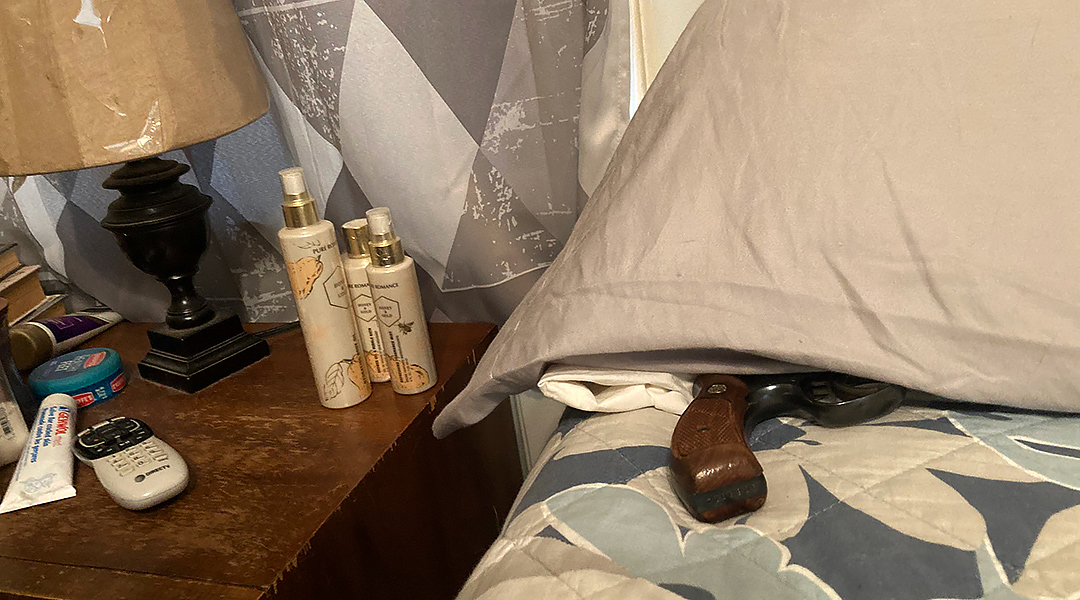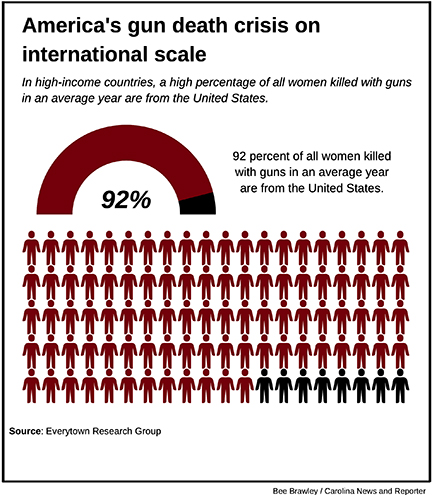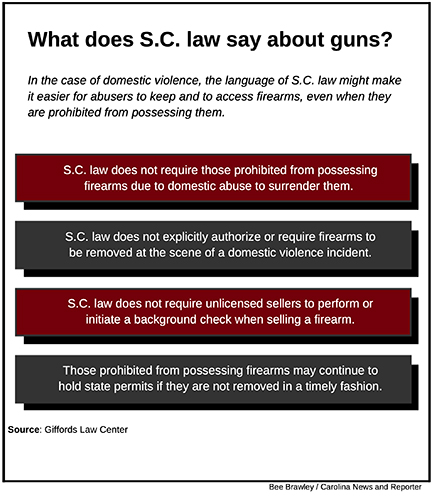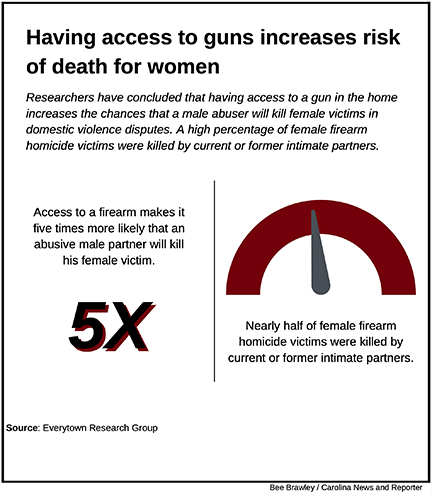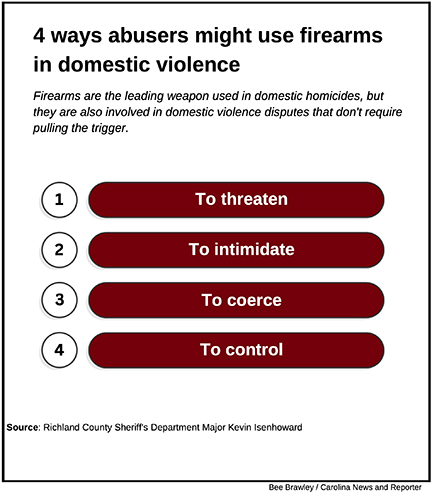Having a gun in a home increases in the risk of death for domestic violence victims. (Photo illustration by Bee Brawley)
Firearms are the most commonly used weapon in domestic violence homicides, but South Carolina law makes it difficult for law enforcement to keep guns out of abusers’ hands.
A confusing, incomplete, and sometime contradictory reading of state gun laws and domestic abuse laws create a murky path for law enforcement seeking to hold abusers accountable.
“Some (domestic violence incidents) rise to the level that a person who is convicted would be prohibited from possessing a firearm, but it doesn’t necessarily provide for us a mechanism to recover the guns,” said Maj. Kevin Isenhoward, an investigator with the Richland County Sheriff’s Department.
Even if someone is prohibited from owning a gun in the state, such as by court order, state law doesn’t require the surrender of firearms or ammunition by the convicted abuser unless it ordered separately by a judge. The law is also unclear as to whether law enforcement officers can seize weapons from the scene of a domestic violence incident.
In many cases, the only option officers have is if they encounter the offender at a later, separate incident, Isenhoward said.
Not only is it difficult to seize guns during domestic violence disputes — including ones that involve a homicide — it also is difficult to prevent offenders from obtaining additional weapons. This difficulty is grounded in the so-called “gun-show loophole.” The loophole allows people to buy and sell guns at gunshows or person-to-person without background checks. Background checks are required if you buy a gun from a licensed gun dealer. Oftentimes, licensed and unlicensed gun sellers are side-by-side at gun shows.
“There’s very little control on the person-to-person transfer of firearms, and that’s a legal transfer,” Isenhoward said. “That’s not even talking about an illegal acquisition of a firearm.”
In fact, the website armslist.com is a Craigslist copycat site that sells guns via a classified ad system.
“America has a very unique problem of the intersection of guns and domestic violence,” said Sara Barber, executive director of the South Carolina Coalition Against Domestic Violence. “Unfortunately, there is very little political will to effectively address that.”
Guns and domestic violence are inextricably linked, and unique to the United States in the industrialized world, Barber said. The country accounts for 92% of all women killed by guns per year within industrialized countries, according to an analysis of data from the Centers for Disease and Control by Everytown, a gun safety research and advocacy group.
Having guns in the home only increases the chances of homicide when domestic violence is involved.
“No matter who that gun belongs to, it is about five times more likely that a homicide will occur,” Barber said, comparing a home with a gun versus one without.
Firearms aren’t only used to kill someone in abusive households. They are used as a method of intimidation or control.
“They are oftentimes used to not necessarily shoot but to threaten, intimidate, coerce, control,” Isenhoward said. “There could be a situation where someone may just pull a gun out and sit it on a table while they’re arguing with someone.”
Isenhoward said there is a difference between having firearms in the home while being safety conscious and having them in the home in an abusive environment.
“I’m really leery about a lot of restrictions on firearms — that’s my personal belief,” Isenhoward said. “But that’s for a healthy environment, not an unhealthy environment.”
Domestic violence doesn’t always involve the use of firearms, but in many cases, it can escalate to gun use.
“There are varying degrees of domestic violence,” Isenhoward said. “However, we know based on our training and our experience that generally if someone stays with someone, the level of violence will escalate, oftentimes to the point where firearms are used.”
“It builds and builds and builds,” added Richland County Sheriff’s Department Investigator Ricky Rains. “It starts with little things, and then it becomes maybe cussing, screaming, yelling. And then, it becomes physically violent.”
Firearms are most often the murder weapon of choice.
“The worst cases that do end up in death (often involve) guns,” Richland County Sheriff’s Department Capt. Heidi Jackson said.
In 2019, 78.6% of domestic homicide victims died because of gunfire, according to Disarm Domestic Violence, a project created by the National Coalition Against Domestic Violence and other organizations.
Despite the laws, or lack thereof, South Carolina has shown improvement recently in domestic homicide rates. But this improvement might be more of a poor reflection on other states than a sign of hope.
South Carolina ranked 6th in the nation in 2019, when 57 women were slain by men, according to the Violence Policy Center’s annual study When Men Murder Women. However, the state still saw 71 killed in 2021.

